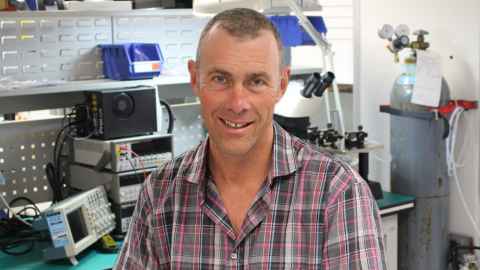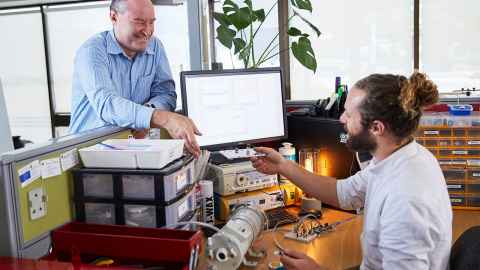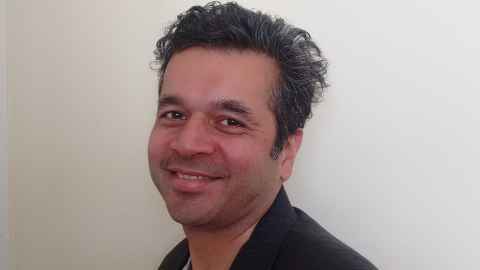Transformative treatments gain $2M HRC funding
24 May 2023
Inventive approaches to persistent health problems gain almost $2 million in HRC funding for University of Auckland researchers.

Research that could dramatically improve healthcare for people with common but hard-to-treat health issues has earned Waipapa Taumata Rau, University of Auckland researchers almost $2 million in Health Research Council Explorer Grants and Emerging Researcher First Grants.
Professor Simon Malpas, Auckland Bioengineering Institute
Transforming the care of people with heart failure through proactive monitoring 24 months, $150,000.
"People with heart failure often have repeated stays in hospital when symptoms of breathlessness and heart palpitations worsen, and they need their mediation adjusted. They frequently experience deteriorating symptoms for some time before seeking help. This means their care is reactive and delayed.
"We propose to utilise a new novel technology of pressure monitoring within the major artery from the heart to the lungs to allow proactive care. This will enable monitoring of people in their own homes and adjustment of drugs remotely. The technology involves the placement of a very tiny pressure sensor within the pulmonary artery. The pressure signals can be read remotely. This is a radical change in care but one we propose will initiate treatment early, reduce stays in hospital and provide overall better outcomes."

Professor Anthony Phillips, Science
A revolutionary solution to a chronic healing problem 24 months, $150,000.
"The rise of diabetes, greater longevity and increasing cost of health delivery, makes interventions to reduce patient time in the health care system a priority.
"One group that contributes significantly to resource use and is associated with major quality of life impacts, includes people with chronic wounds particularly in older populations. Despite considerable research, there are clear challenges and needs that remain to improve the status of many of these patients. At the heart of this need is the diverse and varied nature of the chronic wound as well as their progression and change over time.
"In this project we intend to complete the evaluation and early testing of a new philosophy for managing these wounds that aims to be sufficiently adaptable to accommodate this inherent variation."

Associate Professor Rohit Ramchandra, Faculty of Medical and Health Sciences
Developing novel devices to relieve congestion in heart failure 24 months, $150,000.
"The number one reason why patients over 65 years go to hospital is heart failure. Specifically, patients experience accumulation of fluid in the chest cavity which leads to signs and symptoms of congestion. Currently, even with best standard therapy for decongestion of fluid, more than half of these patients are unable to decongest completely. This is important since incomplete decongestion is a major predictor of further hospitalisations and worsening outcomes.
"Our proposal will target receptors within the large veins to decrease blood volume using a novel device. Currently no drug or device targets these receptors and this may represent a better way to treat congestion. If successful, our device has the potential to transform decongestion in patients with acute decompensated heart failure and improve outcomes."
Emerging Researcher First Grants
Dr Veronica Boyle, Faculty of Medical and Health Sciences
Genomics and Functional Metabolomics of Phaeochromocytomas and Paragangliomas 36 months, $246,918.
"Phaeochromocytomas and paragangliomas (PCC/PGL) are closely related neuroendocrine tumours that produce catecholamines; adrenaline, noradrenaline and/or dopamine. Research is desperately needed to improve the understanding of PCC/PGL in Aotearoa/NZ and to advance our understanding of the biology of these tumours.
"This research will study the epidemiology of PCC/PGL in Aotearoa/NZ to investigate the disparities between ethnicity and location, and the distribution of inherited susceptibility genes. Then, tumour biology will be investigated by combining genomics (analysis of genes within the tumour) and metabolomics (analysis of metabolites within the tumour). Combining genomics and metabolomics tells us which genes have been changed, and how those gene changes impact on the cell function."
Dr Nicola Ludin, School of Nursing, Faculty of Medical and Health Sciences
Sleep, Mental Health and Wellbeing for young people: An online RCT of apps 24 months, $244,755.
"Sleep generally, and especially for young people, has not yet received adequate research attention. In NZ, 39 percent of young people sleep less than recommended for their age, with 57 percent reporting poor quality sleep. Poor sleep and mental health are inextricably linked. The importance of adequate sleep may be minimised in the community. Moreover, sleep is an important target for improving wellbeing, as insufficient sleep not only contributes to poor outcomes in all aspects of physical health but contributes to all psychiatric conditions as well.
"The Sleep Ninja app has been designed by researchers and young people and specifically targets symptoms of insomnia via cognitive behavioural therapy for insomnia (CBT-I). A pilot study of the Sleep Ninja App in Aotearoa is currently underway, and the next crucial step to getting Sleep Ninja into the hands of young people is a randomised controlled trial."
Dr Deborah Raphael, School of Nursing, Faculty of Medical and Health Sciences
The adaptation of a web-based psychosocial intervention for cancer survivors 24 months, $245,102.
"Nearly a quarter of haematological cancer survivors in New Zealand are significantly distressed in the post-treatment period; moreover, cancer survivors often report needing more psychosocial support.
"International evidence suggests that interventions aimed at reducing psychosocial problems in cancer survivors have positive outcomes, including decreased levels of distress. Web-based interventions have proven effective in increasing access to psychosocial support and improving psychosocial wellbeing for cancer survivors.
"This proposed research aims to adapt an existing Australian webbased psychosocial intervention, designed for cancer survivors, for use in NZ. This study will use a participatory action research (PAR) approach to underpin co-design activities. Co-design activities will involve consulting and interviewing cancer survivors, health professionals, and other stakeholders to help review and adapt the intervention for the NZ context. The study will lead to the co-production of a NZ version of a web-based psychosocial intervention aimed at improving psychosocial outcomes in haematological cancer survivors."
Dr Rachael Sumner, Pharmacy, Faculty of Medical and Health Sciences
Toward profiling and treating neurosteroid withdrawal in catamenial epilepsy 36 months, $249,985.
"Epilepsy is one of the most common and debilitating neurological conditions in the world, affecting 1-2 percent of the population. For 40 percent of women with epilepsy, their menstrual cycle will worsen their seizures; they will experience twice as many seizures as they ordinarily would, and only at specific points of their menstrual cycle. This is called catamenial epilepsy.
"In this project we will complete a piloted observational study of (1) females who have catamenial epilepsy, (2) females with epilepsy without catamenial seizures and (3) females without epilepsy. We will compare each group at key phases of the menstrual cycle using blood sampling, electroencephalography, and computational modelling to reveal the mechanisms behind how major shifts in hormones that are caused by the menstrual cycle can change the likelihood of some females with epilepsy having a seizure. We will use this data to rationally design and begin work initiating a patient-centred clinical trial."
Dr Jeanette Rapson, Faculty of Medical and Health Sciences (formerly hosted by Massey University).
Vegetables as first foods for babies, e tamariki, kai o huawhenua i te tuatahi 24 months, $250,000.
"Despite efforts from health initiatives and whānau, Māori children are eating
fewer vegetables than the children in the general population of Aotearoa New Zealand. Introducing vegetables as first complementary foods is a promising strategy to encourage children to like and eat more vegetables from an early age. Yet, achieving this can be difficult with limited evidence-based methods and infant feeding resources, especially those that are Māori-specific and support Māori whānau.
"This project aims to co-create and co-design research with Māori whānau and research partners to develop culturally appropriate strategies and resources to support introducing vegetables as first foods. This will be an important piece of work in addressing inequities in Māori child health with the development of an infant feeding initiative that is responsive, informed, and relevant to Māori and their whānau who wish to support their
child’s vegetable intake and overall hauora/wellbeing."
Media contact
Lisa Finucane, Media and Communications Manager
M: 021 677 216
E: l.finucane@auckland.ac.nz